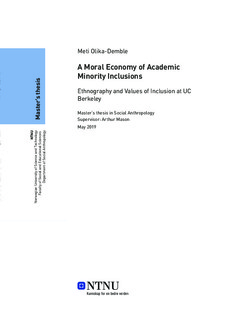| dc.description.abstract | Scholarly discussions on the value of minority inclusion within the university places emphasis on confrontational struggle between claims for regulative facilitation of student wellbeing and claims for individual academic freedom. In this study, I explore diverse academic and social relationalities on the value of inclusion at University of California at Berkeley. I examine the social conditions by which these inclusionary practices emerge, how and for whom they are expressed, as well as the immediacy of reactions they generate. With the pursuit of topical representation and relational variation, this ethnographic study seeks to nuance scholarly discussions on the value of inclusion by addressing the following questions: What agentive roles do minority students claim in the construction and implementation of inclusionary practices at the university? In what ways do administrators and facilitators of learning engage in and promote the production and performance of inclusionary practice at UC Berkeley? In turn, how are such promoted inclusionary practices and sentiments perceived and utilized by the students they are meant to serve?
Firsthand fieldnote representations of various ethnographic contexts depicting diverse informant relations to the value of inclusion provide the empirical opening to reimagine the concept of a particular kind of moral economy as well as to expand its analytical power. In doing so, I understand this moral economy of minority inclusion to be the production, distribution, implementation, and circulation of inclusionary academic and social regulations and sentiments, emotions and values, and rights and obligations at UC Berkeley. I argue that this moral economy of inclusion depends on its participants’ own reproduction and rearrangement of demographic hierarchies through the assignment of deterministic positionalities coupled with a promise of agency by which claims for rights- and obligations to inclusion circulate.
Key words: Inclusion, moral economy, university campus, topical representation, reflective sensitivity, exclusion, moral rights, group identity, minority students, rites of institution, arbitrary hierarchy, subjugated knowledge, microaggression, predestination, responsibility, impression management, para-sites, allyship, privileged students, self-monitoring, moral virtue, moral agency | |
